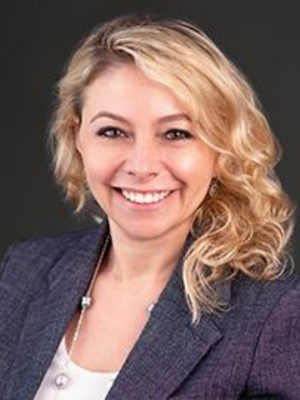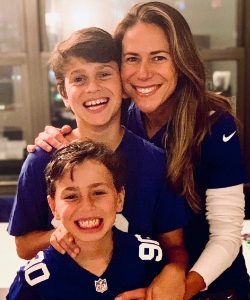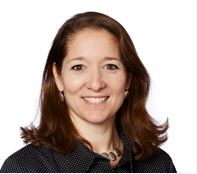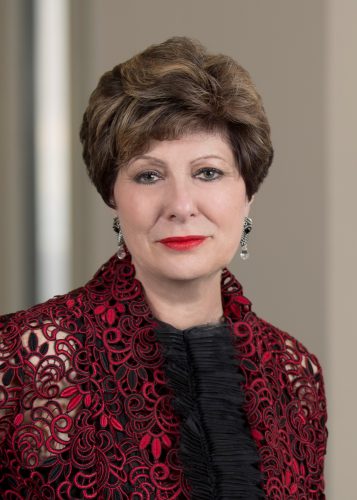 “I realized—and it is a powerful attitude shifter—that everyone you encounter as you navigate your career is in a stage of development,” says Alena Brenner. “While we all have things we are working on, you can still learn from everyone and every interaction.” Brenner, executive vice president, general counsel and corporate secretary at Cornerstone Building Brands, talks about how the immigrant experience influences her work, inventing her own career path to prioritize balance with longevity, networking in male-dominated industries and allowing mistakes to fuel her learning and growth trajectory.
“I realized—and it is a powerful attitude shifter—that everyone you encounter as you navigate your career is in a stage of development,” says Alena Brenner. “While we all have things we are working on, you can still learn from everyone and every interaction.” Brenner, executive vice president, general counsel and corporate secretary at Cornerstone Building Brands, talks about how the immigrant experience influences her work, inventing her own career path to prioritize balance with longevity, networking in male-dominated industries and allowing mistakes to fuel her learning and growth trajectory.
Shaped By the Immigration Experience
When she was a girl, Brenner’s family escaped from Ukraine before the country achieved independence from the former Soviet Union, receiving asylum in the United States. While learning a new language and acclimating to a new culture, she watched her parents work multiple jobs to give their family a new start and a better life.
“The immigrant experience is core to who I am, and because it is so foundational to my identity, I have a natural tendency to put in the hard work it takes to recognize and seize opportunities to learn and grow,” says Brenner. “When my family left Ukraine to pursue a better life, I felt the benefit and burden to both live up to expectations and have gratitude for the opportunities available to me that I would not have had if my family had not immigrated to the United States.”
While she was in high school, she won a scholarship offered by her father’s union to children of union members which allowed Brenner to attend Cornell University. After college, as she considered opportunities to land in a ‘respectable’ field that would provide financial independence and allow her to pursue a variety of career options, she turned to law.
Upon graduating from Fordham University School of Law, Brenner spent nine years with a prestigious law firm, but knew she didn’t want to pursue the partner track. While Brenner was going through a divorce and raising two young children, an in-house opportunity at Anheuser-Busch InBev in New York City became available. Brenner accepted the challenge and went on to play a crucial role in helping integrate two companies after a merger to build the foundation for a new global enterprise.
Forging Her Own Career
“Everyone is on a different path. Some paths may not be linear and may depend on where you are in your life’s journey,” says Brenner. “You’re going to learn to prioritize different things at different stages in your life.”
As a global executive in a high-profile, high-stakes business, Brenner’s career was exciting. But while she loved her job and admired her boss, the pace the work required was not sustainable as she managed the challenges of being a single mother. Though still highly career-driven and ambitious, she realized she wanted to be closer to family and to have the support and balance that offered.
Brenner moved to Miami where her parents lived and accepted a position as corporate counsel with Ryder System, Inc.— a $9 billion transportation and logistics company. She was quickly promoted and eventually became Deputy General Counsel, having expanded the scope of her role significantly. Nine years later, she was tapped to lead Cornerstone Building Brands legal function, a C-Suite role she began in 2021.
Inquisitive and a planner/builder by nature, Brenner has always been interested in learning more about the “how” and “how can we make it better” in her work, which is one reason she was drawn to roles in logistics and manufacturing, including her current position with Cornerstone Building Brands, where she’s spent the last 12 months creating a more robust and effective legal, compliance and risk management team.
Additionally, Brenner knew she wanted to join an organization that believes strongly in cultivating a collaborative and inclusive culture. She found that under the leadership of President and CEO Rose Lee. “Rose has been breaking every ceiling imaginable,” says Brenner. “She strives every day to close the gender gap in our industry and to promote a workplace that is diverse and equitable. She is fostering a culture where team members are encouraged to engage in open dialogue around complex and often difficult topics. We’re also living our purpose through the company’s sustainability, ESG and DE&I mission and goals.”
Currently, Brenner is charged with laying the foundation for a new ESG team and is spearheading the development of a comprehensive, industry-leading sustainability program.
‘Everything Is My Job’
Having worked across a spectrum of male-dominated industries such as beer, tobacco, consumer packaged goods, transportation and now industrial manufacturing, Brenner’s aptitude has enabled her to build relationships with essential business partners. She has a strong track record of taking on strategic business challenges by committing to understand the issue at hand and collaborating with all those involved, at all levels, for context and understanding.
“I think people sense that I’m genuine and earnestly trying to help them be successful in their roles. I am willing to offer an honest, third-party assessment of any issue,” she says. “If you demonstrate that, people start coming to you for counsel and view you as a business partner.”
Brenner has adopted a mentor’s mantra: Everything is my job. Whether calling a manufacturer to solve a high-stakes challenge or running to FedEx to ensure a package goes out on time, anything that contributes to the company’s success is within her scope. “Everything that comes across your desk, you own it and you have a responsibility to make it better,” says Brenner. She looks for the same mindset and sense of ownership in new company hires, too.
Embracing Mistakes as Part of Growth
“I realized—and it is a powerful attitude shifter—that everyone you encounter as you navigate your career is in a stage of development,” says Brenner. “While we all have things we are working on, you can still learn from everyone and every interaction.”
Inclined toward perfectionism, Brenner received excellent advice from one boss on the importance of not being too hard on yourself: The only people who don’t make mistakes are the ones not doing anything. They’re not taking any risk or they’re delegating. Brenner says she was encouraged to make mistakes, which led her to learn more and grow confidence in her legal work and in areas outside of her field of expertise.
“Too often, people are reluctant to take on responsibilities outside of their areas of expertise or comfort zone for fear of failing or because they work in a culture that does not reasonably view mistakes as opportunities to learn, grow and innovate. As a leader, you have to be willing to support a degree of risk-taking to signal to others that making those leaps are supported and encouraged,” says Brenner.” You want to grow and develop people who have ambition and want to learn, so you act to support them and allow them to make mistakes, give the necessary feedback to avoid repeating them and move on to solutions.”
Brenner notes that if she makes a mistake, she might spend a few hours reflecting on what she would have done differently. When she wakes up the next morning, it’s a new start with a unique advantage. She is now better equipped for success because she can apply the lessons learned reflecting on her decision-making to achieve higher performance.
Finding Her Own Way
Working in industries where men tend to fill the highest ranks of leadership, Brenner has often found herself the lone woman in the room. This hasn’t come without challenges, including finding people willing to talk to her, sit next to her or include her in informal networking that is often critical to career advancement. She admits she’s over-prepared, an overachiever and works especially hard to prove her value.
Her networking strategy is to go to as many meetings as invited to, attend events regularly and visit manufacturing facilities with the intention not only to build connections, but also to learn about every aspect of the business.
Serving Others
When she’s not working, Brenner has spent her time working pro bono supporting refugees who have been victims of torture or scarred in some way on their asylum-seeking journeys. She has also helped female victims of domestic violence obtain green cards and gain independence from abusive partners. The work is life-changing for those it impacts, and though often intense, it is also immensely fulfilling.
With her children now 17 and 14, she’s focused on enjoying her time with them before they leave home to make their own mark on the world—one that she’s determined to continue to make better.
“If a certain approach isn’t working, then I know I need to pivot to achieve my goal instead of giving up on it,” says Brenner. “There are infinite ways to pursue your aspirations, so if one way doesn’t work, you can try others until you achieve your goal.”
By Aimee Hansen


 By Laura Keidan Martin, National Chair of Katten Muchin Rosenman’s Women’s Leadership Forum and member of the firm’s Board of Directors and Executive Committee
By Laura Keidan Martin, National Chair of Katten Muchin Rosenman’s Women’s Leadership Forum and member of the firm’s Board of Directors and Executive Committee When you consider your career, it’s vital to get clear on what brings you joy, says Sarah Wolman.
When you consider your career, it’s vital to get clear on what brings you joy, says Sarah Wolman. Have optimism and be proactive, Marci Eisenstein advises young women.
Have optimism and be proactive, Marci Eisenstein advises young women.
